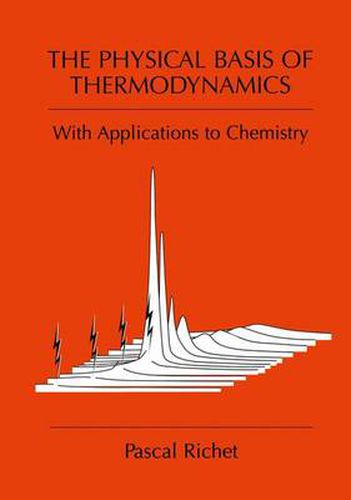Readings Newsletter
Become a Readings Member to make your shopping experience even easier.
Sign in or sign up for free!
You’re not far away from qualifying for FREE standard shipping within Australia
You’ve qualified for FREE standard shipping within Australia
The cart is loading…






This title is printed to order. This book may have been self-published. If so, we cannot guarantee the quality of the content. In the main most books will have gone through the editing process however some may not. We therefore suggest that you be aware of this before ordering this book. If in doubt check either the author or publisher’s details as we are unable to accept any returns unless they are faulty. Please contact us if you have any questions.
Given that thermodynamics books are not a rarity on the market, why would an additional one be useful? The answer is simple: at any level, thermodynamics is usually taught as a somewhat abstruse discipline where many students get lost in a maze of difficult concepts. However, thermodynamics is not as intricate a subject as most people feel. This book fills a niche between elementary textbooks and mathematically oriented treatises, and provides readers with a distinct approach to the subject. As indicated by the title, this book explains thermodynamic phenomena and concepts in physical terms before proceeding to focus on the requisite mathematical aspects. It focuses on the effects of pressure, temperature and chemical composition on thermodynamic properties and places emphasis on rapidly evolving fields such as amorphous materials, metastable phases, numerical simulations of microsystems and high-pressure thermodynamics. Topics like redox reactions are dealt with in less depth, due to the fact that there is already much literature available. Without requiring a background in quantum mechanics, this book also illustrates the main practical applications of statistical thermodynamics and gives a microscopic interpretation of temperature, pressure and entropy. This book is perfect for undergraduate and graduate students who already have a basic knowledge of thermodynamics and who wish to truly understand the subject and put it in a broader physical perspective. The book is aimed not at theoretical physicists, but rather at practitioners with a variety of backgrounds from physics to biochemistry for whom thermodynamics is a tool which would be better used if better understood. Endorsement: “From the first paragraph of the first chapter, this text informs the reader that he/she was lucky enough to find an excellent book to finally understand chemical thermodynamics. The level of writing is suitable for any audience whether undergraduate, graduate, or industry professional. The reader is not bombarded with overly mathematical and boring theoretical diatribe. Rather, it is as if five scientific copyeditors collaborated and approved each word as "the right way to explain things.‘ And, that is how the text comes across to the reader.’ Dawn Lee Wakefield, Ph.D. (Texas A&M)
$9.00 standard shipping within Australia
FREE standard shipping within Australia for orders over $100.00
Express & International shipping calculated at checkout
This title is printed to order. This book may have been self-published. If so, we cannot guarantee the quality of the content. In the main most books will have gone through the editing process however some may not. We therefore suggest that you be aware of this before ordering this book. If in doubt check either the author or publisher’s details as we are unable to accept any returns unless they are faulty. Please contact us if you have any questions.
Given that thermodynamics books are not a rarity on the market, why would an additional one be useful? The answer is simple: at any level, thermodynamics is usually taught as a somewhat abstruse discipline where many students get lost in a maze of difficult concepts. However, thermodynamics is not as intricate a subject as most people feel. This book fills a niche between elementary textbooks and mathematically oriented treatises, and provides readers with a distinct approach to the subject. As indicated by the title, this book explains thermodynamic phenomena and concepts in physical terms before proceeding to focus on the requisite mathematical aspects. It focuses on the effects of pressure, temperature and chemical composition on thermodynamic properties and places emphasis on rapidly evolving fields such as amorphous materials, metastable phases, numerical simulations of microsystems and high-pressure thermodynamics. Topics like redox reactions are dealt with in less depth, due to the fact that there is already much literature available. Without requiring a background in quantum mechanics, this book also illustrates the main practical applications of statistical thermodynamics and gives a microscopic interpretation of temperature, pressure and entropy. This book is perfect for undergraduate and graduate students who already have a basic knowledge of thermodynamics and who wish to truly understand the subject and put it in a broader physical perspective. The book is aimed not at theoretical physicists, but rather at practitioners with a variety of backgrounds from physics to biochemistry for whom thermodynamics is a tool which would be better used if better understood. Endorsement: “From the first paragraph of the first chapter, this text informs the reader that he/she was lucky enough to find an excellent book to finally understand chemical thermodynamics. The level of writing is suitable for any audience whether undergraduate, graduate, or industry professional. The reader is not bombarded with overly mathematical and boring theoretical diatribe. Rather, it is as if five scientific copyeditors collaborated and approved each word as "the right way to explain things.‘ And, that is how the text comes across to the reader.’ Dawn Lee Wakefield, Ph.D. (Texas A&M)